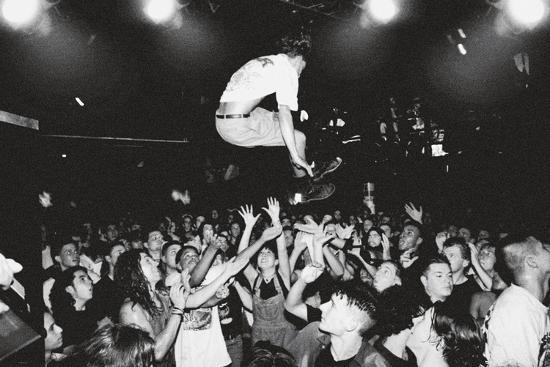BACK
The Modern Most Pit
(2015)
My first time having a near spiritual musical experience was 1995. I was eight-years-old and the Mortal Kombat movie had just come out. The Elder Gods once-in-a-generation tournament designed to keep peace between our world and The Outerworld provided perhaps the most important soundtrack of my youth. The tourney's theme song was four and a half minutes of pure '90s techno. It was perfect for living out my dreams of being Johnny Cage and delivering a "flawless victory" to my haters.
Later, in my formidable years, it was the often maligned and critically underrated emo. My discovery of the genre happened like a Zach Braff movie. There was a girl. There was a car. And there was Deja Entendu. Whatever the cultural consensus is on the genre, it's worth noting that an entire suburban generation's teenage angst was fueled by KaZaa downloads of screamo performed by multiple worded band names.
There were four guys and one girl packed into an old Acura Legend shouting every single line of "You're So Last Summer." We'd trade line for line, each person knowing exactly when Adam Lazzara's line ended and when John Nolan's started. The content of what we were singing was irrelevant. It was the camaraderie of the music that was important.
Now, every weekend, I find myself chasing that feeling. The unmistakable feeling of a song you know being played. The unmistakable feeling of a song you know the people you came with know being played. Your group separates. One person tries to bum a cigarette. Someone else is fighting with someone else. Your other two friends are taking shots of well whiskey. One of them will inevitably forget their debit card.
Then, a Future song. A Drake. Bad girl RiRi. Kanye. Young Thug. I've been in the middle of a conversation with complete strangers and made bee lines to the dance floor, with full confidence that my comrades would show up shortly in tow. And, without skipping a beat, the people you came with, along with all of the other people in attendance, shout the hook in perfect unison:
"Fuck up some commas, let’s fuck up some commas/Let's fuck up some commas, let’s fuck up some commas."
"I got enemies, got a lot of enemies/Got a lot of people tryna drain me of my energy."
"Bitch better have my money/Bitch better have my money/Pay me what you owe me.
On special nights, this ritual can look almost ritualistic. The crowd swaying in rhythmic unity, their heads bobbing to every snare hit, their arms moving up and down like a metronome counting down the next beat drop. Fingers pointed to your friends. Everyone knows the hooks. Certain people know the verses. Only a few can spit Young Thug bars, so you just mumble the words you definitely know, like "two bitches," "swag, terrific," "lifestyleeeeee."
Spotify and Soundcloud means we have every song, b-side, remix, BBC 1 set, Japanese iTunes-only track and CDQ record available at any given moment. The rise of the aux cord, once just a Twitter meme, has now come to encompass a small genre, but growing phenomenon of DJs playing exactly what the crowd wants to hear. There's no technical limitations to consider, no BMPs to match up and no limited press vinyl to worry about. The aux cord DJ reads the crowd and answers appropriately.
Clubs have always existed under the guise of partying, specifically through drinking and dancing. No one went to the club so they could hear the new Jay Z track that they could just listen to in their car. A few years ago, you'd be hard-pressed to find a group of males to openly admit that they were going out so they could dance to "Some Cut" by themselves. But, week in and out, I find myself in a trashy bar, with three other dudes moshing to Travi$ Scott.
Although the normal cool kid hierarchy exists around the venue itself, the dance floor is free. Its price of admission? Genuine enjoyment for the music being played. Because you know this song, you are my friend. Disparate squads merge, creating a circle to keep the energy up, the lyrics of Drake giving your temporary friendships temporary validity. They are not the violent mosh pits of the past, but they're far from gentle. The contemporary mosh pit is smaller and more collapsible. As quickly as they form, they are even more quickly dispersed. Pop music if fickle. One summer you're Bobby Shmurda. The next, you're, well, still Bobby Shmurda.
The physical auxiliary cord has existed forever. The 1/8 inch cable has been a mainstay since we figured out we could play our portable CD players through our car's tape deck. They serviced us when we no longer wanted to listen to the radio. But as soon as bluetooth technology replaced the analog connection, we wanted it back. So, we created an entire culture around it and bestowed those who controlled it with great power.
Those who holds the aux cord are god. They are harbingers of the night, dictating the mood of the backseat of a car or a dance floor or someone's house party. It's equally a privilege and an obligation. You've got to know your music library and the library of your listeners. You've got to know if it's low-key or lit.
There are very few rock stars left that can encourage a mosh pit. In its absence are those pressing play, picking your next spiritual music moment for you.
--
Back to Nicksugai.com
Later, in my formidable years, it was the often maligned and critically underrated emo. My discovery of the genre happened like a Zach Braff movie. There was a girl. There was a car. And there was Deja Entendu. Whatever the cultural consensus is on the genre, it's worth noting that an entire suburban generation's teenage angst was fueled by KaZaa downloads of screamo performed by multiple worded band names.
There were four guys and one girl packed into an old Acura Legend shouting every single line of "You're So Last Summer." We'd trade line for line, each person knowing exactly when Adam Lazzara's line ended and when John Nolan's started. The content of what we were singing was irrelevant. It was the camaraderie of the music that was important.
Now, every weekend, I find myself chasing that feeling. The unmistakable feeling of a song you know being played. The unmistakable feeling of a song you know the people you came with know being played. Your group separates. One person tries to bum a cigarette. Someone else is fighting with someone else. Your other two friends are taking shots of well whiskey. One of them will inevitably forget their debit card.
Then, a Future song. A Drake. Bad girl RiRi. Kanye. Young Thug. I've been in the middle of a conversation with complete strangers and made bee lines to the dance floor, with full confidence that my comrades would show up shortly in tow. And, without skipping a beat, the people you came with, along with all of the other people in attendance, shout the hook in perfect unison:
"Fuck up some commas, let’s fuck up some commas/Let's fuck up some commas, let’s fuck up some commas."
"I got enemies, got a lot of enemies/Got a lot of people tryna drain me of my energy."
"Bitch better have my money/Bitch better have my money/Pay me what you owe me.
On special nights, this ritual can look almost ritualistic. The crowd swaying in rhythmic unity, their heads bobbing to every snare hit, their arms moving up and down like a metronome counting down the next beat drop. Fingers pointed to your friends. Everyone knows the hooks. Certain people know the verses. Only a few can spit Young Thug bars, so you just mumble the words you definitely know, like "two bitches," "swag, terrific," "lifestyleeeeee."
Spotify and Soundcloud means we have every song, b-side, remix, BBC 1 set, Japanese iTunes-only track and CDQ record available at any given moment. The rise of the aux cord, once just a Twitter meme, has now come to encompass a small genre, but growing phenomenon of DJs playing exactly what the crowd wants to hear. There's no technical limitations to consider, no BMPs to match up and no limited press vinyl to worry about. The aux cord DJ reads the crowd and answers appropriately.
Clubs have always existed under the guise of partying, specifically through drinking and dancing. No one went to the club so they could hear the new Jay Z track that they could just listen to in their car. A few years ago, you'd be hard-pressed to find a group of males to openly admit that they were going out so they could dance to "Some Cut" by themselves. But, week in and out, I find myself in a trashy bar, with three other dudes moshing to Travi$ Scott.
Although the normal cool kid hierarchy exists around the venue itself, the dance floor is free. Its price of admission? Genuine enjoyment for the music being played. Because you know this song, you are my friend. Disparate squads merge, creating a circle to keep the energy up, the lyrics of Drake giving your temporary friendships temporary validity. They are not the violent mosh pits of the past, but they're far from gentle. The contemporary mosh pit is smaller and more collapsible. As quickly as they form, they are even more quickly dispersed. Pop music if fickle. One summer you're Bobby Shmurda. The next, you're, well, still Bobby Shmurda.
The physical auxiliary cord has existed forever. The 1/8 inch cable has been a mainstay since we figured out we could play our portable CD players through our car's tape deck. They serviced us when we no longer wanted to listen to the radio. But as soon as bluetooth technology replaced the analog connection, we wanted it back. So, we created an entire culture around it and bestowed those who controlled it with great power.
Those who holds the aux cord are god. They are harbingers of the night, dictating the mood of the backseat of a car or a dance floor or someone's house party. It's equally a privilege and an obligation. You've got to know your music library and the library of your listeners. You've got to know if it's low-key or lit.
There are very few rock stars left that can encourage a mosh pit. In its absence are those pressing play, picking your next spiritual music moment for you.
--
Back to Nicksugai.com
Published in Four-Pins (2015)
by Nickolaus Sugai
![]()
by Nickolaus Sugai
